The recent appearance of white supremacist groups in Nashville has caused concern among city officials and residents. In July, masked white supremacists marched through the city carrying upside-down American flags, followed by another neo-Nazi group waving swastika flags along the famous strip of honky-tonks and bars. These groups disrupted a City Council meeting, harassed Holocaust survivors’ descendants, and yelled racist slurs at young Black children.
The brazen display of hate speech by the Patriot Front and the Goyim Defense League in a major American city like Nashville has sparked outrage and alarm. Civic leaders and residents are now faced with the challenge of addressing these groups without infringing on their right to free speech. State Representative Aftyn Behn expressed shock at the sight of white supremacists marching through the city and emphasized the need for Nashville to define its values in the face of such provocations.
These groups have gained visibility since the 2017 “Unite the Right” rally in Charlottesville and have become significant sources of white supremacist propaganda. While other far-right groups like the Proud Boys have faced legal consequences for their involvement in the Capitol riot, white supremacists like those in Nashville have continued to spread racist and antisemitic messages nationwide. Incidents of plotting to disrupt events, protesting musical performances, and causing disturbances at city council meetings have been reported in various parts of the country.
Addressing and combating neo-Nazi marches in urban areas like Nashville requires a multi-faceted approach. City officials must balance upholding free speech rights with protecting residents from hate speech and violence. Strategies such as increased law enforcement presence, community education and engagement, and partnerships with anti-hate organizations can help cities respond effectively to such threats.
It is crucial for communities to come together to denounce hate groups and promote inclusivity and diversity. By standing united against bigotry and discrimination, cities like Nashville can send a powerful message that hate has no place in their streets. The recent incidents in Nashville serve as a reminder of the ongoing threat posed by white supremacist groups and the importance of proactive measures to address and prevent such displays of hate in urban areas.


















